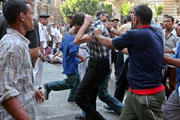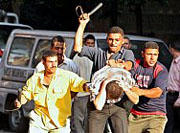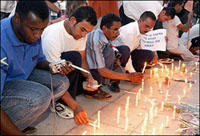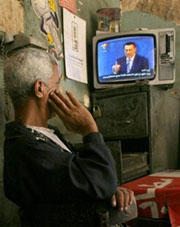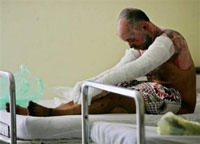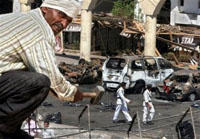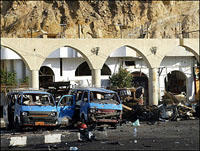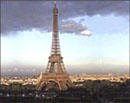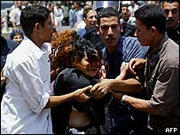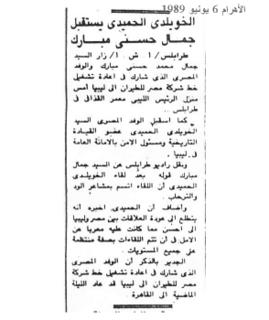
Under US and western pressure, the yes-yes and the 99% President decided to take the path of democracy, deciding on a referendum on multiple candidacy for president's office. Glorious Referendum day came on May 25, peaceful demonstrators were beaten by security and women were raped by thugs hired by the government. The day turned to be another successful day for the efforts of the government to empower Egyptians. We were trying to still believe that a person with absolute power is giving up for democracy. However, last Saturday, some honorable Egyptian judges produced a report on the results of the referendum.The report was published by al Masry el Yom newspaper. Here is the text in English as cited from this newspaper.
If these are the conclusions of the Egyptian judges who are supposed to oversee the polls, then this Referendum should be considered null and void and unconstitutional. Enjoy!
Following the Judges' Club General Assembly of May 13th in which it was agreed to form a fact finding commission to assess the experience of the May 25 referendum, especially with respect to judicial supervision and how fully it is going to be exercised, a commission was indeed formed of:
Commission Formation:
- Court of Cassation VP Hussam El Gharabany, Head
- Court of Cassation VP Muhamad Nagy Derballa, Member
- Court of Cassation VP Talaat Abdallah, Member
- Court of Appeal President Hisham Genena, Member
- Court President Ahmad Fathy Qazma, Member
The Commission was done with its report on the 28th of June and is supposed to circulate it later this week.
Al Masry Al Youm was able to secure a copy and following are the main findings of the report and its recommendations:
Sources of Information:The report depended on testimonials provided by judges and members of the judicial body who participated in the supervision of the referendum. The Commission considered them witnesses to the violations and forgery committed on May 25, especially that the judges provided written, audio taped and video taped evidence which helped the Commission prepare a report that is substantiated by figures, documents, pictures, CDs and videotapes. According to the Commission, it disregarded any testimonials or memos that did not have supporting documentation/evidence.
Report Findings:-- The Report refers to statements made by officials in the press to the effect that the number of judges/members of the judiciary who participated in the supervision of the elections was 11125, and that 20 only regretted for health reasons. Those figures - if true - would mean that the judiciary only supervised 20% of the branch polling stations which negates allegations that the referendum was held under full judicial supervision. Moreover, those figures are false because all judges affiliated to the Courts of Cassation and Appeal, as well as judges of that rank, a total of over 3000 judge, were not assigned any supervisory role during the referendum.Judicial supervision did not exceed 5% of the branch polling stations.
Every Main polling station was headed by a judge (rank of courtpresident), with three substitutes who are of the same rank. The jurisdiction of the Main Polling station extended over large geographicalareas which made it virtually impossible for the main judge or any of hissubstitutes to supervise/monitor the voting taking place in the branchstations under their jurisdiction either because of their remoteness ortheir large number (some main polling stations had 400 branch ones underthem). Hence, the role of those judges at the main stations was restricted to supervising the vote count at the main stations once the ballot boxes reached them. Some main polling stations (for example in Beni Swaif) there were discrepancies between the voters' lists available at the station and the ones issued by the Security Directorate (names added/dropped) which indicates the lists were revised after 4/30/2005 in violation of the law on political rights.
As noted earlier, members of the judiciary supervised only 5% of the branch polling stations, and their jurisdiction did not extend beyond their own branch station to others nearby, and the branch stations headed by judges were all collected in the same place (i.e classrooms of a school), far away from those supervised by non-judges. The majority of the branch stations were headed by state employees from other GOE bodies: namely state employees and employees of the Ministry of Local Administration, with no consideration to their educational level, rank, or reputation. For instance, one of the district attorneys ran into someone who was heading a polling station who was detained 45 days in a counterfeit case but was later released on LE 500 bail.
Most of the judges heading the branch polling stations insisted - inaccordance with the political rights' law - not to open the door for voting until two of the registered voters are added to the supervision of the station (note: according to the law, a polling station is not ready to receive voters/votes unless two registered voters - namely the first two to arrive - be part of the supervision and are to stay from the time voting starts until it ends. It should be noted that many voters complained the day of the referendum of such insistence by judges because the first voters would not accept staying all day and skipping work which meant that that polling station would not receive any voters). The report added that this insistence by the judges angered the GOE officials, the police officers present, as well as some attorney generals and presidents of primary courts.
The stations that were headed by judges witnessed low voter turnout --some had no voters whatsoever, while others had a turnout that did not exceed 3%. One judge quoted a police officer as telling him jokingly: "We do not want to tire out your excellencies. We are satisfied with the(turnout) other stations." The turnout at stations that were not supervised by judges reached 90% and in some cases 100%. The latter percentage would mean that none of the voters on the lists had died or moved since the lists were prepared, or was even sick or unable to vote on that day for whatever reason. Moreover, many of such heads of branch stations were done with their work and submitted the ballot boxes to the main stations long before the closing time. When asked about the high turnout phenomenon and the early closing time, the following happened: some started crying, some just stared blindly at the ceiling, some tried to run away, some said they were pressured to do so by the police officers, or answers like: "this is the way we always did it," "I am only a poor man following instructions," "the officer told me, finish up, you do not want to get dragged into unnecessary trouble."
A member of a main polling station noted that he attended a meeting for the non-judicial heads of polling stations that was attended by a high ranking police officer who stressed the importance of reaching a certain turnout percentage, by accepting voters from outside the constituency, even if they are not registered (note: which is what happened with me) or if they had to fill out the ballots themselves. When this member said he could not because there are judges in his station, the officer asked to take aside those who will be in non-judicial stations to give them special orders.
A judge in Alexandria commenting on that noted a woman - who identified herself as an NDP local leader - wanted to fill out other ballots but he denied her request, adding "I don't know if she stoppedthere or went to other branch stations." The report adds that "a colleague discovered at the vote counting stage that the head of a branch committee counted a number of votes as invalid, and it turned out that this was his tactic to decrease the number of voters opposed to the amendment."
According to the report also, some "colleagues" took pictures while theballot boxes of stations that had no judicial supervision were being emptied, showing ballots "roped together" which proves that they were not put through the slot (as they would be too thick) but were rather put there when the box was open. There are pictures taken of open boxes in an open field with people sitting next to it, taking some out and throwing it away.Also, there were pictures taken of a non-judicial head of a branch station who was filling out the ballots himself and then handing them to someone else to put them in the box.
The report claims that some of the presidents of the primary courtsworked in favor of rigging the voting process. Namely, a number of themasked the judges who were assigned substitute duty during the elections, to stay in their hotels, denying their request to pass by the branch stations to supervise the voting process.
Recommendations:
- Merge the close by branch stations so that they would be at most 1/4 ofwhat they are now.
- Hold the elections - any elections - on several days.
- Have all branch and main polling stations headed by judgesAssign judges to head the main branches at the primary courts.


